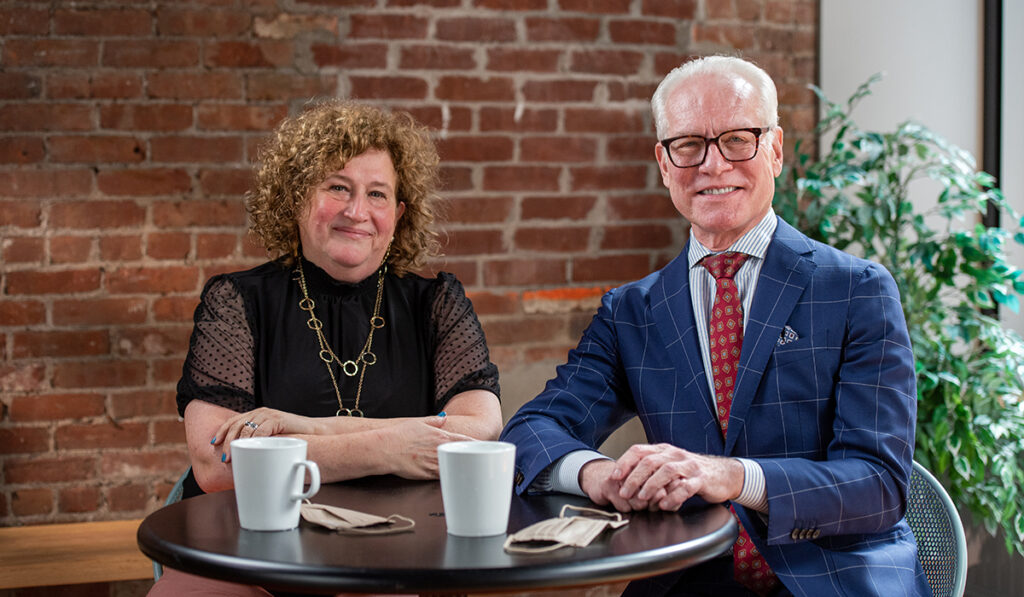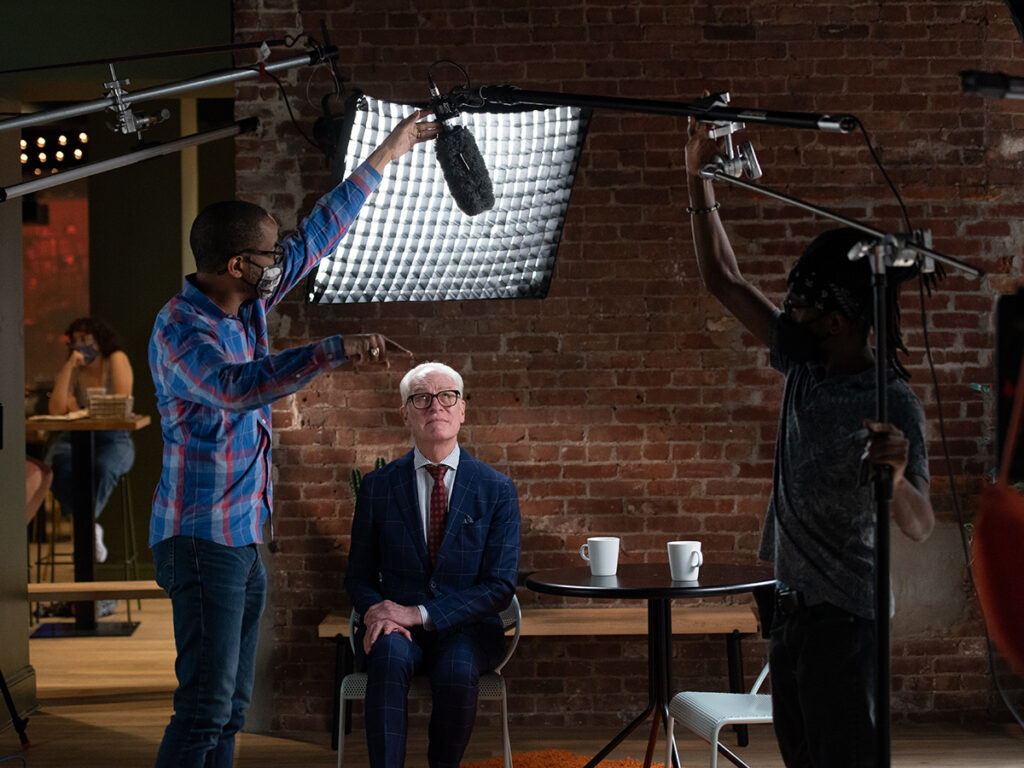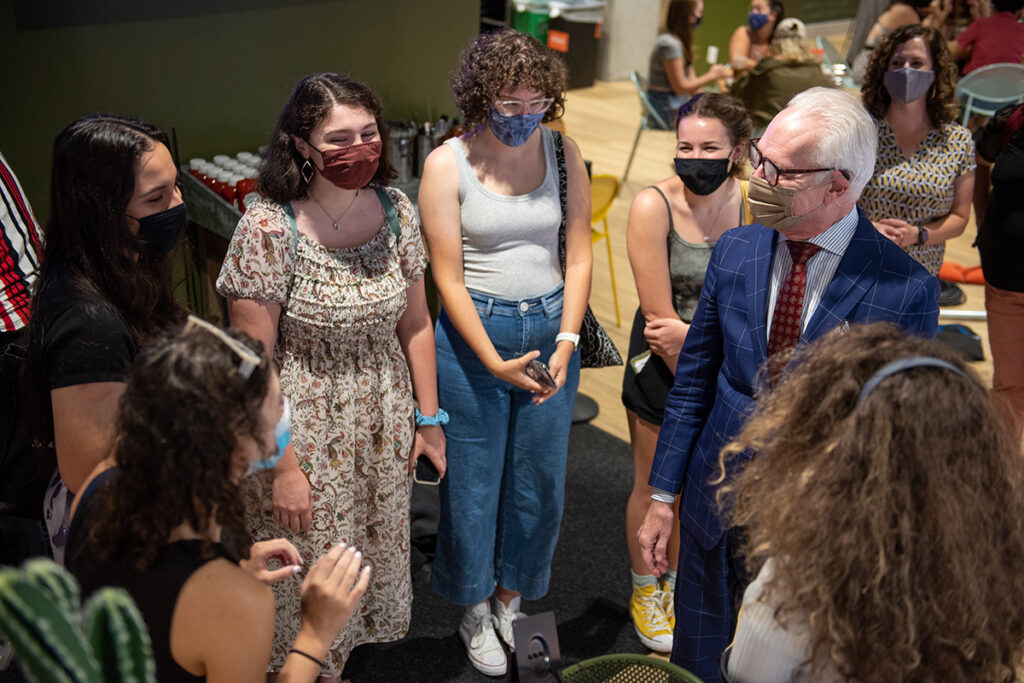Why Should You Have Students Watch Project Runway in a Fashion Class

This January, Emerson students will accept the opportunity to help solve a human trouble with 1 of telly's well-nigh beloved on-air mentors: Tim Gunn, of Project Runway and Making the Cut.
Innovation for Impact, a unique iv-credit winter session course team taught past Gunn and Sharon Topper, Marketing Advice affiliated kinesthesia member, is a primary form in taking an idea and making information technology a reality. Undergraduate students from any major, working as individuals or in small groups, are invited to submit a pitch for a project they hope to develop during the class. Pitches are due by October 20, with accepted projects announced on November 10. The course will run December 20-January vii.
Apply to Innovation for Impact
Emerson Today talked to Gunn and Topper well-nigh the course and what makes it unique. This interview has been edited for length.
Meet the Faculty:
Tim Gunn: A lot of people don't know that I spent almost of my career as an educator, as a teacher — also as an administrator. I was chair of the Department of Fashion Blueprint at Parsons [School of Pattern], the final vii and a one-half of the 24 years that I was there, and the Projection Runway producers discovered me …at Parsons and asked me to be a consultant for this new testify they had, a reality contest testify with fashion designers called Project Runway.
That was 17 years ago…I'm happy to say [quondam model and TV host] Heidi Klum and I have landed on Amazon Prime Video with a new prove called Making the Cut, which we dear, and nosotros're waiting to hear whether we get picked up again. I will as well boast that I'thou a New York Times-bestselling author — who knew that would happen? I'm a vocalization on Disney Inferior in a show called Sofia the First, I played Baileywick the castle steward, and as well another Disney testify called Mickey and the Roadster Racers. I play a very cranky journalist who reports on travel.
Sharon Topper: I worked for startups for…over xx years, based in State of israel, doing European marketing, global marketing. [I] started here at Emerson 2019, and am just completely blown away by the customs, the creativity. I was telling Tim, [I take] the best of both worlds, didactics the Business organization minor to creative major[southward] is amazing, because they accept all the kind of ideas and inspiration and … they choice the Business small and so they can really empathize how to make it work.
How it Came to Be:
TG: It's one thing to have the idea, it'south another matter to bring it to fruition. I just desire to add, it's considering of Sharon that I'm here. I was invited as a speaker in a series that Sharon had. We had a wonderful chat for the series, Sharon and I, and I, quite frankly fell in love with her, and we didn't know nosotros'd have such fabulous chemistry together. And so I was a guest critic of sorts, in Sharon'south other Spring semester class, and fell in love with the Emerson community — with the level of intelligence and artistic thinking and risk-taking. It's a fantastic place. I'm actually wowed.
ST: The class was MB400, by the manner, which is the capstone of the Business organisation minor…1 of the modules of the course is having each student pitch an idea to the rest of the class. So they pick the ones that they desire to work on well-nigh. So they pick three or four, and then they create the teams effectually them, and then build them, go through the market demand, who'southward the customer until the concluding presentation, which Tim also was part of critiquing. It was astonishing.
TG: I was and then impressed then captivated by my ane experience with Sharon'due south students. I actually asked, 'Can I do the [course] finale?' and was thrilled to be function of information technology. What also impressed me was the synergy that the students have among themselves and the style in which they work together and so supportively. At the aforementioned time, they're willing to challenge each other…They're an impressive community.
ST: The ideas were very personal. Ane educatee's family bought an inn before the pandemic, and it'southward modest and they don't have the staff of a huge hotel, so her idea was to come upwards with a advice platform that she can work with the guests with, which was no-bear on, which was giving them personal attending. [Information technology was b]rilliant, yous know, as an app that she could then go and offer to other small inns also.
TG: Which they needed.
ST: They desperately needed. You know, obviously, a hotel like the Four Seasons has unlimited resource.

TG: However, equally I said to that grouping of students, if y'all're at the Four Seasons, housekeeping comes when housekeeping comes. With this app, you can schedule it. I mean, I thought the Four Seasons needed it too.
ST: Admittedly, yeah. And so we see that innovation comes from people who are non afraid to gamble, to think creatively, [exhibit] original thinking around a problem, a existent problem that'southward facing that they're familiar with. So that was the whole impetus for this winter class.
What are you almost excited about sharing with students in this new course?
TG: I'm just excited well-nigh what they're going to bring, because it's a big unknown. We don't accept any foregone conclusions or desires, other than helping brand the earth a meliorate place. And I await forward to that. I love getting excited near something new.
ST: Yes, it's unscripted, that's the part that I beloved. Information technology's experiential. Information technology's non about teaching the same class, again and again, information technology's really driven by where the students have it.
We're going to be bringing in speakers from all different industries and backgrounds to kind of share their stories and share their expertise. I've worked generally for startups, and I teach that in my classes too, some things you lot but learn by doing. But it's as well what you practice [and] things encounter that never happened before. You just bargain with it as it comes.
Tim has said a lot of wise things. I hateful, seriously, since I've known him, he says these things that just stick in my brain, and ane of the biggest ones is talking about life['s] serendipitous path, and not knowing what any experience is going to bring you for the futurity. We have students who are going out and finding their path.
I think that is another affair that we want to sort of talk almost is, whatsoever you do, y'all could come up with your own idea. You tin can work for a company, you might work for a company that you thought would exist your dream task, and so you hate information technology because it'south just non what yous want. This grade is meant to empower our students to know that they tin do anything. We're encouraging people to do what they feel comfortable with, simply the richer the experience, the better the production will be.
Who should utilize for Innovation for Impact?
TG: Well, someone who was has a passion about a human issue, a social responsibleness issue that … requires having inventiveness and profound ideas. Sharon and I keep saying [it's] about passion. You don't believe in this ane,000 pct? Don't do it. We're looking for that kind of contagious prepare of seeds that will really flower and flourish.
ST: Also, I take to say, people who are fearless, people who are not afraid to neglect, because there'south ever failure involved, that'southward where you learn. And [people who are] not afraid to sympathize that something might not be working, and pivot, understand that they tin can exercise information technology in a unlike way.
TG: [To] learn from the fact that it didn't work. We're all in this together. We're all partners on this.

ST: It's open, literally, to anyone who has an idea.
Describe Your Teaching Style
TG: I draw it as Socratic. I pummel my students with questions.
ST: I similar to think of myself as a mentor that teaches from my experience, merely also listens. I usually start off my classes asking about people'southward experience, …in schoolhouse and work and at home, because all of this is part of their background and their experience. I like to think of myself as a good listener.
What are some education methods you've learned over the years that you can utilise to this course?
TG: You need to let things happen. You need the students to do 60-70 percent of the work. As Sharon said, you need to be a proficient listener, and that'southward why I pummel people with questions, because I demand to know where they're coming from and what their objectives are, and then assist them mensurate how well they're achieving that. And only being open to all possibilities.
ST: I would say for me, to not assume that I have the answer, the definitive answer, because I tap things simply from what I know and my feel, just it doesn't mean that someone else's feel doesn't piece of work for somebody else. I don't claim to have all the answers. In fact, when y'all're talking about certain things — specifically, social media — I look my students to know much more than I do. I'm sort of on the other side of the digital divide, having grown up in tech startups, right? But something like social, they go it. It's a two-fashion learning experience.
What are some innovations that have blown you abroad?
ST: I mean, something equally simple, I judge, or every bit ubiquitous now equally an iPhone. I can't imagine living without it. It has completely changed the photography market place, printing, communication. This little device does and so much. In my one-time life, working for startups, you become to the tech shows and yous see these astonishing things all the fourth dimension that people come with, but a lot of them are derivative. But the jail cell phone, it'due south really hard to imagine what life was similar before information technology.
TG: I'll say, speaking for the world or worlds of retail, not simply way, online shopping. Quite remarkable what that has become.
ST: Earlier at that place was a cell phone, before at that place was online shopping, there was no jail cell phone or online shopping, correct? Someone came upwardly with that idea, thought most the need of having your unabridged music library in a device, and then adding the phone to it, similar an iPod, and so iterating. That'southward the wonderful thing well-nigh innovation.
TG: Information technology becomes fully integrated into your life and inextricable from your life.
What makes Emerson a good fit for this and you?
TG: I retrieve information technology'due south fairly authentic to say that the seeds of this course were sown based on the experiences that Sharon has had, and that she's now shared with me almost what the Emerson student population is capable of. It's grown out of this culture.
ST: We really are known every bit a creative community, but the greatest ideas come from the creatives. I mean, you could be an engineer and exist creative. Or yous could be an artist or theatre major and come up with an innovation that's going to modify the entire industry. It's just taking them through the process, from outset to terminate, to get the confidence that they can do that, no matter what they're doing.
They can innovate, also, at the existing visitor they're at, they don't have to start their own startup, they can just recollect innovatively.
Learning from other cultures is so important.
TG: Which is why we're looking for a very various student population in this course.
Visit the Innovation for Impact spider web page
(Visited ane,189 times, 1 visits today)

0 Response to "Why Should You Have Students Watch Project Runway in a Fashion Class"
Post a Comment